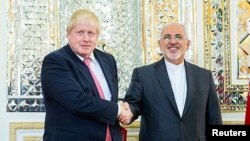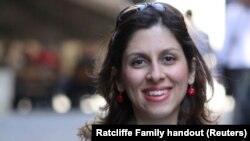British Foreign Secretary Boris Johnson traveled to Tehran on Saturday to call for the release of a jailed British-Iranian aid worker.
Johnson met his Iranian counterpart, Mohammad Javad Zarif, to talk about the consular case of Nazanin Zaghari-Ratcliffe. He asked for the release of the mother of one child on humanitarian grounds, along with other dual nationals.
Zaghari-Ratcliffe, who was arrested in Tehran in April 2016, is serving a five-year prison term for a conviction on national security charges. Britain, however, says Zaghari-Ratcliffe was visiting family on holiday when she was jailed for allegedly attempting to overthrow the government. Zaghari-Ratcliffe has denied all accusations.
The meeting came a day before authorities in Iran were to set a date for Zaghari-Ratcliffe's trial, according to The Guardian newspaper.
Richard Ratcliffe, the woman's husband, told the newspaper that his wife would appear in court Sunday to face charges of spreading propaganda.
New charges against Zaghari-Ratcliffe apparently stem from a statement made by Johnson, who told a parliamentary committee on November 1 that Zaghari-Ratcliffe had been "training journalists" in Iran.
Johnson later apologized for the statement, saying it was not true and affirming that Zaghari-Ratcliffe had only been visiting relatives in the Islamic republic.
On November 4, however, Zaghari-Ratcliffe was brought to an unscheduled court hearing, at which Johnson's comments were used as evidence for a new charge that she had been spreading "propaganda against the regime."
Richard Ratcliffe said he thought his wife was about to be released before Johnson made his remarks.
Zaghari-Ratcliffe's employer, the Thomson Reuters Foundation, has said she was not working in Iran.
Johnson's first visit to Iran comes amid rising tension in the Middle East. According to the BBC, Johnson is expected to bring attention to Britain's lasting support for the international nuclear deal with Iran. He also is expected to emphasize Britain's concerns about Iran's activities in Yemen and Syria.






